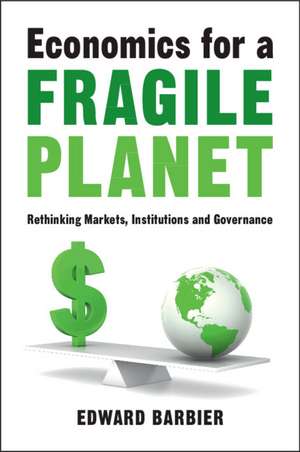Economics for a Fragile Planet: Rethinking Markets, Institutions and Governance
Autor Edward Barbieren Limba Engleză Paperback – 30 mar 2022
| Toate formatele și edițiile | Preț | Express |
|---|---|---|
| Paperback (1) | 238.55 lei 3-5 săpt. | +18.14 lei 6-12 zile |
| Cambridge University Press – 30 mar 2022 | 238.55 lei 3-5 săpt. | +18.14 lei 6-12 zile |
| Hardback (1) | 471.38 lei 6-8 săpt. | |
| Cambridge University Press – 30 mar 2022 | 471.38 lei 6-8 săpt. |
Preț: 238.55 lei
Nou
Puncte Express: 358
Preț estimativ în valută:
45.65€ • 47.76$ • 37.92£
45.65€ • 47.76$ • 37.92£
Carte disponibilă
Livrare economică 13-27 martie
Livrare express 26 februarie-04 martie pentru 28.13 lei
Preluare comenzi: 021 569.72.76
Specificații
ISBN-13: 9781108823388
ISBN-10: 1108823386
Pagini: 250
Dimensiuni: 152 x 228 x 19 mm
Greutate: 0.47 kg
Ediția:Nouă
Editura: Cambridge University Press
Colecția Cambridge University Press
Locul publicării:Cambridge, United Kingdom
ISBN-10: 1108823386
Pagini: 250
Dimensiuni: 152 x 228 x 19 mm
Greutate: 0.47 kg
Ediția:Nouă
Editura: Cambridge University Press
Colecția Cambridge University Press
Locul publicării:Cambridge, United Kingdom
Cuprins
Preface; 1. Introduction; 2. Humankind and the planet; 3. Economics for a fragile planet; 4. Climate change; 5. Land use change and biodiversity; 6. Freshwater; 7. Oceans and coasts; 8. Public policies; 9. Business; 10. Conclusion.
Recenzii
'This is the most thorough and expansive introduction to a conception that sees the human economy as embedded in Nature. Beautifully written and technically adroit, it displays the author's wide social sympathies. University courses in environmental and resource economics can find no superior text today to include on their list.' Professor Sir Partha Dasgupta, University of Cambridge
'Ed Barbier was at the frontier of new economic thinking with Blueprint for a Green Economy. Here, he continues to innovate and challenge us to reinvent and realign economics for a fragile planet. And not a moment too soon.' Steven Stone, UN Environment Programme
'At the intersection of economics and the environment, Barbier's timely book details in a clear and accessible way the rationale for saving our planet. For too long we have undervalued nature – at our peril. Barbier lays out the roadmap for the kind of economic thought and policymaking needed to save our 'fragile planet' – for us and those who will inherit this earth from us.' Achim Steiner, United Nations Development Programme
'This is a must-read book for anybody concerned about the future of the environment and the lives of current and future generations. It dissects the underlying causes of today's environmental emergencies, climate change, loss of biodiversity, quantity and quality of water, and degradation of the marine environment. It assess their impacts on human well-being and identifies the changes needed in our economic and financial systems to become a more sustainable and equitable society. This book shows that business as usual is not an option, but the solutions exist - actions are needed now by governments, businesses, financial institutions and consumers.' Professor Sir Robert Watson, CMG, FRS
'Ed Barbier was at the frontier of new economic thinking with Blueprint for a Green Economy. Here, he continues to innovate and challenge us to reinvent and realign economics for a fragile planet. And not a moment too soon.' Steven Stone, UN Environment Programme
'At the intersection of economics and the environment, Barbier's timely book details in a clear and accessible way the rationale for saving our planet. For too long we have undervalued nature – at our peril. Barbier lays out the roadmap for the kind of economic thought and policymaking needed to save our 'fragile planet' – for us and those who will inherit this earth from us.' Achim Steiner, United Nations Development Programme
'This is a must-read book for anybody concerned about the future of the environment and the lives of current and future generations. It dissects the underlying causes of today's environmental emergencies, climate change, loss of biodiversity, quantity and quality of water, and degradation of the marine environment. It assess their impacts on human well-being and identifies the changes needed in our economic and financial systems to become a more sustainable and equitable society. This book shows that business as usual is not an option, but the solutions exist - actions are needed now by governments, businesses, financial institutions and consumers.' Professor Sir Robert Watson, CMG, FRS
Notă biografică
Descriere
As global environmental challenges mount, this book offers a policy blueprint for building a safer, sustainable and more inclusive world.
